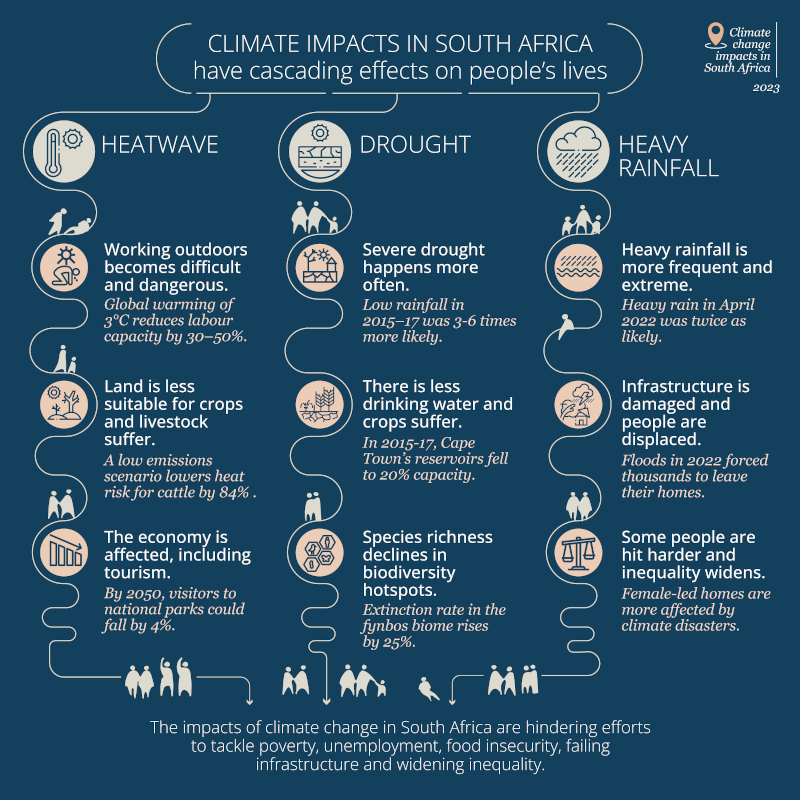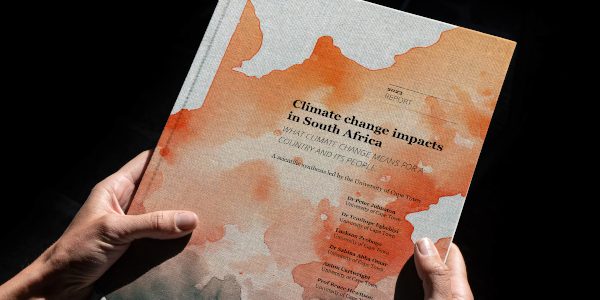Climate change poses a major threat to South African livelihoods, landscapes, and culture. Researchers at the University of Cape Town have recently released a synthesis report highlighting the potential impact of climate change in South Africa and how these changes will impact our economy and ecosystems.
A new climate change impact synthesis report titled, “Climate change impacts in South Africa: What climate change means for a country and its people”, highlights the impacts of climate change on South Africa and the cascading effect these changes may have on people’s lives. The report was compiled by Dr Peter Johnston, Dr Temitope Egbebiyi, Luckson Zvobogo, Dr Sabina Abba Omar, Anton Cartwright and Prof Bruce Hewitson, climate change researchers at the University of Cape Town.
Climate change risks to the country
While South Africa faces many social and economic challenges, such as food insecurity and high unemployment rates, agriculture and biodiversity remain vital assets of the country. Agricultural exports and ecotourism are significant contributors to the South African economy, while small-scale farming plays a vital role in supporting a substantial portion of the population. Climate change threatens these assets with increased frequency and intensity of droughts, heatwaves and severe flooding in some parts of the country. These extreme weather events are likely to damage crops and infrastructure, and threaten plants and animals that attract tourism. The impacts of climate change are likely to affect livelihoods, food and water security and ultimately increase the cost of living for South Africans.
“South Africa is a well-resourced country, with a strong agricultural and biodiversity heritage. Climate change and socioeconomic risks threaten to bring about a huge change to this status. How South Africa copes with these changes will depend on the response of all its people, but especially policymakers and planners,” explains Dr Peter Johnston, UCT Climate System Analysis Group.

Building resilience
Small-scale and commercial farmers alike acknowledge the threat of climate change to their lives and farms, with adaptation strategies ranging from soil carbon enhancement to indigenous rainwater harvesting. While these efforts have mitigated some impacts, there’s concern that they may not be enough under future climate scenarios, especially for small scale farmers. Small-scale farmers face greater vulnerability due to structural barriers like limited access to finance and infrastructure. Addressing climate change through nature-smart initiatives could simultaneously tackle inequality, poverty, and infrastructure failures, complementing slow-moving state-led reform programs.
“Climate impacts and extreme weather events affect different people in different ways, but we have to collectively respond to make ourselves adapt. To farmers, crops are important; to insurers, payouts are important; and to a man living in an informal settlement, his house matters, but we all have to work together to address the crisis,” says Mr Luckson Zvogbo a postdoctoral research fellow at UCT’s African Climate & Development Initiative (ACDI).
South Africa’s role in international climate negotiations
The growing severity, however, of climate change depends the ability of the world to reduce global greenhouse gas emissions. South Africa’s economic trajectory heavily relies on the swift transition from coal to solar and wind energy to ensure affordable and dependable electricity. Additionally, South Africa advocates for a “just transition” in international climate talks, emphasizing social justice and urging high-income nations to fund decarbonization efforts and address climate-related impacts in middle- and low-income countries, with national emission targets set accordingly.
“South Africa has led calls for a ‘just transition’ in international climate negotiations – a process of putting people and livelihoods at the centre of climate responses. Given the contribution of the agricultural and conservation sectors to employment creation in South Africa, climate responses in these sectors form an important part of the country’s just transition,” explains Anton Cartwright, Director at Econologic.
Combating the impacts of climate change requires both adaptive measures (e.g., adaptive farming practices) as well as governmental coordination and international commitment to reduce emissions.
To cite this report: Johnston, P. et al. (2023) Climate change impacts in South Africa: What climate change means for a country and its people. University of Cape Town, South Africa.
